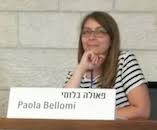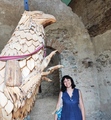Studying at the University of Verona
Here you can find information on the organisational aspects of the Programme, lecture timetables, learning activities and useful contact details for your time at the University, from enrolment to graduation.
Academic calendar
The academic calendar shows the deadlines and scheduled events that are relevant to students, teaching and technical-administrative staff of the University. Public holidays and University closures are also indicated. The academic year normally begins on 1 October each year and ends on 30 September of the following year.
Course calendar
The Academic Calendar sets out the degree programme lecture and exam timetables, as well as the relevant university closure dates..
| Period | From | To |
|---|---|---|
| FULL YEAR | Oct 2, 2017 | Jun 9, 2018 |
| Semester 1 | Oct 2, 2017 | Jan 20, 2018 |
| Semester 2 | Feb 26, 2018 | Jun 9, 2018 |
| Session | From | To |
|---|---|---|
| Winter session | Jan 22, 2018 | Feb 24, 2018 |
| Summer session | Jun 11, 2018 | Jul 28, 2018 |
| Autumn session | Aug 27, 2018 | Sep 22, 2018 |
| Session | From | To |
|---|---|---|
| LAUREE LINGUE - sessione autunnale a.a. 2016/2017 | Dec 18, 2017 | Dec 21, 2017 |
| LAUREE LINGUE - sessione invernale a.a. 2016/2017 | Mar 23, 2018 | Mar 29, 2018 |
| LAUREE LINGUE - sessione estiva | Jul 16, 2018 | Jul 21, 2018 |
| LAUREE LINGUE - sessione autunnale | Nov 12, 2018 | Nov 17, 2018 |
| LAUREE LINGUE - sessione invernale | Apr 12, 2019 | Apr 18, 2019 |
| Period | From | To |
|---|---|---|
| Immaculate Conception | Dec 8, 2017 | Dec 8, 2017 |
| Christmas break | Dec 22, 2017 | Jan 7, 2018 |
| Easter break | Mar 30, 2018 | Apr 3, 2018 |
| Liberation Day | Apr 25, 2018 | Apr 25, 2018 |
| Labour Day | May 1, 2018 | May 1, 2018 |
| Patron Saint Day | May 21, 2018 | May 21, 2018 |
| Republic Day | Jun 2, 2018 | Jun 2, 2018 |
| Summer break | Aug 13, 2018 | Aug 18, 2018 |
| Description | Period | From | To |
|---|---|---|---|
| ANNUALE | ANNUALE | Oct 2, 2017 | Jun 9, 2018 |
Exam calendar
Exam dates and rounds are managed by the relevant Foreign Languages and Literatures Teaching and Student Services Unit.
To view all the exam sessions available, please use the Exam dashboard on ESSE3.
If you forgot your login details or have problems logging in, please contact the relevant IT HelpDesk, or check the login details recovery web page.
Should you have any doubts or questions, please check the Enrollment FAQs
Academic staff
 valentina.adami@univr.it
valentina.adami@univr.it
 paola.bellomi@univr.it
paola.bellomi@univr.it
 daniele.beltrame@univr.it
daniele.beltrame@univr.it
 paolamaria.caleffi@univr.it
paolamaria.caleffi@univr.it
 riccardo.cella@univr.it
riccardo.cella@univr.it
 elisa.dallarosa@univr.it
elisa.dallarosa@univr.it
 sara.dattoma@univr.it
sara.dattoma@univr.it
 mariangela.lando@univr.it - marilando771@gmail.com
mariangela.lando@univr.it - marilando771@gmail.com
 stefania.montemezzo@univr.it
stefania.montemezzo@univr.it
 chunye.niu@univr.it
chunye.niu@univr.it
 alessia.polatti@univr.it
alessia.polatti@univr.it
 dora.renna@univr.it
dora.renna@univr.it
 fabioantonio.scrignoli@univr.it
fabioantonio.scrignoli@univr.it
 tania.triberio@univr.it
tania.triberio@univr.it
 sonia.trovato@univr.it
sonia.trovato@univr.it
Study Plan
The Study Plan includes all modules, teaching and learning activities that each student will need to undertake during their time at the University.
Please select your Study Plan based on your enrollment year.
1° Year
| Modules | Credits | TAF | SSD |
|---|
1st foreign language2nd foreign language1st foreign literature and cultureGerman literature and culture 1
2nd foreign literature and cultureGerman literature and culture 1
2° Year activated in the A.Y. 2018/2019
| Modules | Credits | TAF | SSD |
|---|
1st foreign language2nd foreign languageFirst language foreign literature and culture or a related courseEnglish literature and culture 2
German literature and culture 2
Spanish literature and culture 2
Second language foreign literature and culture or a related courseEnglish literature and culture 2
German literature and culture 2
Spanish literature and culture 2
Geography of communication and international trade
Italian literature and culture
Modern and Contemporary Economic History
Theory and Techniques of communication
3° Year activated in the A.Y. 2019/2020
| Modules | Credits | TAF | SSD |
|---|
1st foreign language2nd foreign languageComparative and European Public law
Principles of international marketing
| Modules | Credits | TAF | SSD |
|---|
1st foreign language2nd foreign language1st foreign literature and cultureGerman literature and culture 1
2nd foreign literature and cultureGerman literature and culture 1
| Modules | Credits | TAF | SSD |
|---|
1st foreign language2nd foreign languageFirst language foreign literature and culture or a related courseEnglish literature and culture 2
German literature and culture 2
Spanish literature and culture 2
Second language foreign literature and culture or a related courseEnglish literature and culture 2
German literature and culture 2
Spanish literature and culture 2
Geography of communication and international trade
Italian literature and culture
Modern and Contemporary Economic History
Theory and Techniques of communication
| Modules | Credits | TAF | SSD |
|---|
1st foreign language2nd foreign languageComparative and European Public law
Principles of international marketing
| Modules | Credits | TAF | SSD |
|---|
Legend | Type of training activity (TTA)
TAF (Type of Educational Activity) All courses and activities are classified into different types of educational activities, indicated by a letter.
English literature and culture 2 [Tur] (2018/2019)
Teaching code
4S002910
Teacher
Coordinator
Credits
9
Language
English
Scientific Disciplinary Sector (SSD)
L-LIN/10 - ENGLISH LITERATURE
Period
I semestre dal Oct 1, 2018 al Jan 12, 2019.
Learning outcomes
The course, taught in English, is meant to provide students with an introduction to British literature from the Renaissance to Enlightenment, focussing on some of the most representative works. It also aims at introducing the main critical approaches and the main features of literary genres.
The overall goal of the course is to provide students with a good level of knowledge of literary history (in terms of historical context, texts, genres, movements and authors) and to develop their critical skills for analysis, argumentation and exposition in English, in relation to various typologies of literary texts in their historical-cultural context.
At the end of the course, students will be able to:
- analyse the set texts and place them in their respective historical-cultural contexts
- discuss the texts in a structured and informed way, taking into account literary conventions and applying an informed critical approach
- discuss literary topics in English in a clear and consistent way
Program
The course provides students with an overview on the representation of the figure of the “Other” and on the concepts of Englishness and Blackness in the English colonial literature of the end of XVII century and of XVIII century. Starting from an introduction to the English social and cultural context from the XVI to the XVIII century, the course will focus on the colonial era and its literary production by considering the relationship between colonizers and colonized people. We will examine both points of view in order to consider how stereotypes and racism characterised the complex interrelationship between “them” and “us”. Particular emphasis will be laid on the relationship between literary texts and their historical and socio-cultural contexts, in order to understand how literature has been vehicle of prejudices which have supported the colonial cause.
The course will be taught by means of lectures to be held in English. Students will have to bring their own primary texts at the exam.
PRIMARY TEXTS
• Aphra Behn, Oroonoko, or The Royal Slave (1688)
• Daniel Defoe, The Life and Adventures of Robinson Crusoe (1719)
• Olaudah Equiano, The Interesting Narrative of the Life of Olaudah Equiano, Or Gustavus Vassa, The African (1789)
CRITICAL TEXTS:
• Andrew Sanders, The Short Oxford History of English Literature (dal cap. 3 al cap. 5)
• Banani Biswas, “Oroonoko: A ‘Royal Slave’ and/or a Master of Dignity”, in Advances in Language and Literary Studies, Vol 6, No 4 (2015), pp. 208-215.
• Andrew Fleck, “Crusoe’s Shadows. Christianity, Colonization and the Other”, in Christian encounters with the Other, 1998, pp. 74-89.
• Jocelyn Stitt, “Olaudah Equiano, Englishness, and the Negotiation of Raced Gender”, in MI: MPublishing, University of Michigan Library, vol. 14, 1999-2000, pp. 1-14.
ADDITIONAL CRITICAL TEXTS for students unable to attend lectures:
• Oddvar Holmesland, "Aphra Behn's "Oroonoko": Cultural Dialectics and the Novel", in ELH, Vol. 68, No. 1 (Spring, 2001), pp. 57-79
• David Blewett, “Robinson Crusoe, Friday, and the Noble Savage: The Illustration of the Rescue of Friday Scene in the Eighteenth Century”, in Man and Nature, 5, 1986, pp. 29-49.
• Laura Doyle, “Middle-Passage Plots”, in Freedom’s Empire: Race and the Rise of the Novel in Atlantic Modernity, 1640-1940, 2008, pp. 183-211.
| Author | Title | Publishing house | Year | ISBN | Notes |
|---|---|---|---|---|---|
| Oddvar Holmesland | "Aphra Behn's "Oroonoko": Cultural Dialectics and the Novel" | 2001 | in ELH, Vol. 68, No. 1 (Spring, 2001), pp. 57-79 | ||
| Andrew Fleck | “Crusoe’s Shadows. Christianity, Colonization and the Other” | 1998 | in Christian encounters with the Other, 1998, pp. 74-89 | ||
| Laura Doyle | “Middle-Passage Plots” | 2008 | in Freedom’s Empire: Race and the Rise of the Novel in Atlantic Modernity, 1640-1940, 2008, pp. 183-211 | ||
| Jocelyn Stitt | “Olaudah Equiano, Englishness, and the Negotiation of Raced Gender” | 2000 | in MI: MPublishing, University of Michigan Library, vol. 14, 1999-2000, pp. 1-14 | ||
| Banani Biswas | “Oroonoko: A ‘Royal Slave’ and/or a Master of Dignity” | 2015 | in Advances in Language and Literary Studies, Vol 6, No 4 (2015), pp. 208-215 | ||
| Aphra Behn | Oroonoko, or The Royal Slave | 1688 | |||
| David Blewett | “Robinson Crusoe, Friday, and the Noble Savage: The Illustration of the Rescue of Friday Scene in the Eighteenth Century” | 1986 | in Man and Nature, 5, 1986, pp. 29-49 | ||
| Olaudah Equiano | The Interesting Narrative of the Life of Olaudah Equiano, Or Gustavus Vassa, The African | 1789 | |||
| Daniel Defoe | The Life and Adventures of Robinson Crusoe | 1719 | |||
| Andrew Sanders | The Short Oxford History of English Literature | Clarendon Press, Oxford | 1994 |
Examination Methods
Oral exam in English at the end of the course.
The exam will assess the knowledge of texts on the syllabus and the capacity to critically discuss the problematic issues they deal with. In particular students will have to demonstrate knowledge of the historical and literary period; knowledge of texts and contexts (to be able to read primary texts within their historical, geographical and political framework); capacity to critically comment literary texts (to be able to discuss and analyse literary texts in a thoughtful manner and with the aid of critical works); ability to use theoretical tools; ability to express the critical interpretations of texts in clear and effective manners.
Type D and Type F activities
To discover all the teaching activities accredited by the foreign teaching college click here
Career prospects
Module/Programme news
News for students
There you will find information, resources and services useful during your time at the University (Student’s exam record, your study plan on ESSE3, Distance Learning courses, university email account, office forms, administrative procedures, etc.). You can log into MyUnivr with your GIA login details: only in this way will you be able to receive notification of all the notices from your teachers and your secretariat via email and soon also via the Univr app.
Student login and resources
Gestione carriere
Assegnazione tutore
Attività accreditate D/F
Calendario didattico dettagliato
Cambio lingua curriculare
Competenze informatiche
Competenze linguistiche (prima e seconda lingua)
Competenze linguistiche in triennale (terza lingua CFU F)
Compilazione del piano didattico
Corso di Lingua portoghese
Erasmus+ e altre esperienze all'estero
Linguistic training CLA
Presentazione dei corsi di studio e Open day
Graduation
List of theses and work experience proposals
| Stage | Research area |
|---|---|
| PROGETTO MAMBRINO Stage per bibliografia | Various topics |
Saperi minimi
Stage e tirocini
Nel piano didattico della laurea triennale in Lingue per il turismo e il commercio internazionale (L12) è previsto un periodo di stage obbligatorio (CFU 6) in organizzazioni imprenditoriali.
Le attività di stage sono finalizzate a far acquisire allo studente una conoscenza diretta in settori di particolare interesse per l’inserimento nel mondo del lavoro e per l’acquisizione di abilità professionali specifiche.
Le attività di stage sono svolte sotto la diretta responsabilità di un singolo docente presso studi professionali, enti della pubblica amministrazione, aziende accreditate dall’Ateneo veronese.
I crediti maturati in seguito ad attività di stage saranno attribuiti secondo quanto disposto nel dettaglio dal “Regolamento d’Ateneo per il riconoscimento dei crediti maturati negli stage universitari” vigente.
- Tutte le informazioni in merito agli stage per futuri studenti sono disponibili alla pagina Stage e tirocini.
- Tutte le informazioni in merito agli stage per studenti iscritti sono pubblicate in MyUnivr - come fare per - stage e tirocini.
- Tutte le informazioni in merito agli stage per le aziende sono disponili alla pagina Stage e tirocini per azienze.
Ulteriori informazioni al seguente link https://www.univr.it/it/i-nostri-servizi/gestione-carriere-studenti-lingue-e-letterature-straniere/stage-e-tirocini-lingue-e-letterature-straniere


 +39 045802 8409
+39 045802 8409

























































